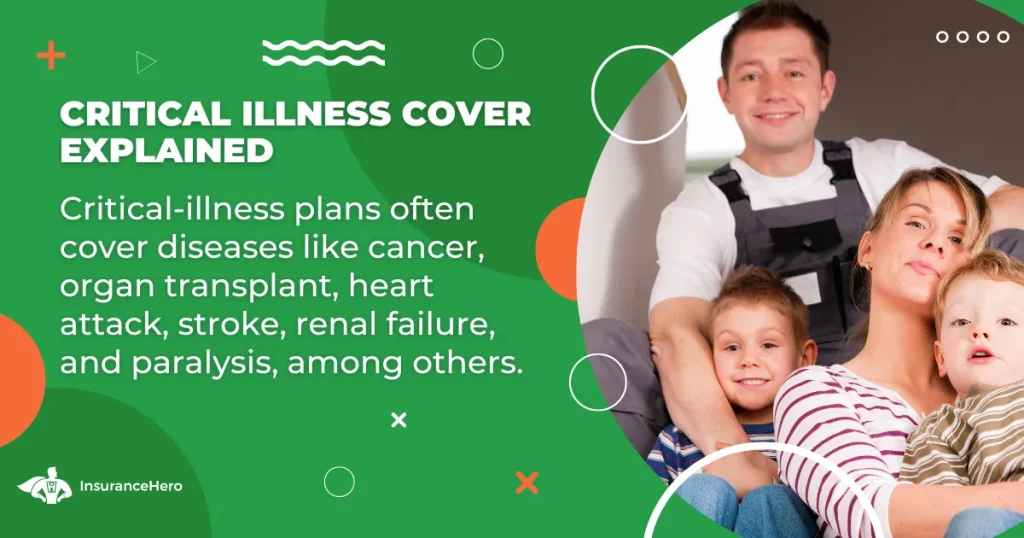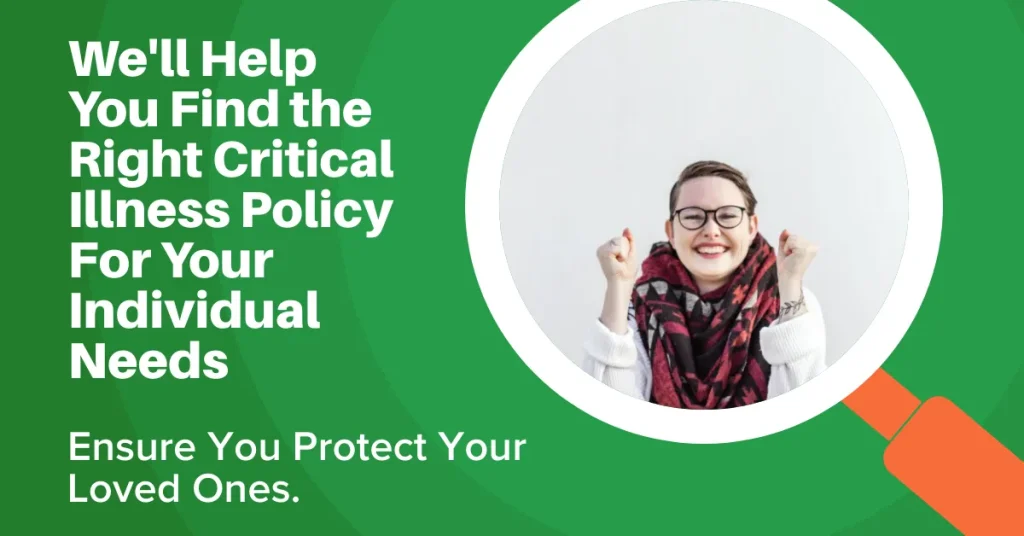Critical Illness Cover Your Guide For 2026

Being diagnosed with a critical illness is usually quite traumatic. When the individual realises that work is no longer an immediate possibility, the trauma changes to worry.
How will the family afford the current lifestyle? Even if you’re single or have no beneficiaries, panic might set in, as you will be left without financial support, especially given the 2026 cost of living.
After all, critical illnesses often require drastic lifestyle changes or treatments. Even with savings, these costs can exceed what you can handle. How do you find the funds to support yourself and your family?
Selling one’s assets, such as a home or a car, is always an option. But to be fair, it is more than most people can handle when they are well, let alone critically ill. Fortunately, you may not need to go through any of that.
To minimise the impact a critical condition like a stroke or cancer can have on your loved ones, all it takes is protecting yourself with comprehensive critical illness insurance.
Help Protect Your Family’s Future, Compare Top UK Insurers. Find Your Cheapest Quote ⏱ Takes About 60 Seconds.


What Is Critical Illness Cover?
A critical illness plan is designed to pay out when the insured is diagnosed with a serious condition and is included on the insurance company’s list.
Heart attack, cancer, paralysis, stroke, coronary artery bypass surgery, and a major organ transplant are usually on this list.
Total or permanent disability may also be included as a subset of this coverage. A typical critical illness policy covers approximately 36 conditions.
However, only three broad categories are currently required to be included in a basic policy: advanced stages of cancer, strokes, and heart attacks causing permanent symptoms.
Critical illness insurance can typically be purchased separately or added to your existing life insurance policy as supplemental insurance.
Either way, it serves the same purpose: supporting you and your beneficiaries if you are diagnosed with any of the conditions listed in the policy.
How Critical Illness Plans Work
The insured must live for at least 14 days following the diagnosis to receive payment. The lump sum is tax-free and can be used to pay living expenses, medical bills, and debts such as mortgages or to adapt the home to accommodate impaired mobility or incapacitation.
This money allows financial commitments to be met, so policyholders can focus on treatment or recuperation without worrying about supporting their families or themselves.
Premiums are based on age, sex, occupation, health, smoking status, level of coverage, and length of coverage. If one of the covered illnesses runs in your family, expect to pay higher premiums.
Premiums are usually fixed for a period, but some policies offer flexible premiums, allowing the insured to increase coverage as needed.
Spouses can buy a joint policy that covers both of them. However, some policies only cover the first person diagnosed with a critical illness. Some policies cover dependent children when they reach a particular age.
Since the cash payout may be used for any purpose, many people choose to apply it to their recovery. The money can be used to pay for treatments not provided by the NHS, holistic therapies, or special therapeutic equipment.
By shortening their recovery time, policyholders can get their lives back to normal. If returning to work following an injury or illness is not possible, an included total and permanent disability (TPD) clause may apply and provide a lump-sum payment.

What Does Critical Illness Insurance Cover?
Critical illness coverage pays out when an insured individual is diagnosed with a critical illness. But what exactly do insurers mean by critical conditions?
Which illnesses a policy covers will depend on its type and coverage range. The most comprehensive critical illness policies can cover over 50 conditions, while others are limited to 20 or 30.
The most common examples of critical illnesses covered by most insurers include the following:
- heart attack
- stroke or coverage for after a stroke
- certain types and stages of cancer
- major organ transplants
- conditions like multiple sclerosis
- traumatic head injuries
- Alzheimer’s disease
- Parkinson’s disease
- liver failure
Additionally, many policies cover permanent disabilities caused by injuries or illnesses. Less severe conditions can also be covered, although they will pay smaller payments.
Many insurance policies also automatically include children’s critical illness coverage, paying out a smaller sum when one of your children is diagnosed with any of the covered conditions.
Are there any exclusions? These will depend on the policy you choose.
Typically, conditions excluded from critical illness policies include:
- non-invasive cancers
- non-life-threatening injuries, for example, broken bones
- hypertension, which is abnormally high blood pressure
That said, comparing different life insurance policies is vital, especially if you want specific conditions covered.
How Much Does Critical Illness Cover Cost?
Critical illness cover costs are based on monthly premiums like any other insurance policy. These can vary widely from one insurer to another. However, your insurance costs won’t depend on the company you buy insurance from.
Essentially, the factors that will impact your insurance premiums include the following:
- Your age. The older you get, the more likely you are to develop specific conditions. Therefore, the insurer is likely to charge higher premiums because the likelihood of paying out increases with age. If you’re looking for a policy when older, a good option might be over-50s life insurance, specifically dedicated to people aged 50 and older.
- Your and your family’s medical history. If you’re in good health or your medical history is free of any serious conditions, you can expect your premiums to be lower. The same goes for your family’s medical history. The premiums will be lower if you have no history of critical illnesses in your immediate family. If your health isn’t in the best condition or you have numerous examples of severe diseases in the family, the insurer can deem you high risk and charge higher policy premiums.
- Your occupation. What you do for a living will also impact your premiums. Some jobs are much riskier than others. For instance, life insurance for firefighters will cost more than a school teacher’s insurance policy. If your occupation significantly impacts your health, you can expect your critical illness coverage to be more expensive.
- Your lifestyle choices and hobbies. If you smoke or drink, you’re at a higher risk of a heart attack, stroke, or developing certain types of cancer. As a result, any insurer will deem you a higher risk, which will automatically increase your monthly premium. Your hobbies can also play a role in a company’s calculation of your premium. For example, if you engage in motorsports or skydiving, your insurance premiums will likely be higher.
These are the most common factors to consider when choosing the right critical illness cover. To be exact, they will impact any life insurance you want to purchase, so be sure you have them in mind when looking for the best quote.
In addition, the cost of your coverage may also depend on your sex. For instance, men tend to pay higher premiums than women, and policy complexity also affects premiums.
The most comprehensive critical illness policies will cost more than those that cover only a few conditions.

What to Consider Before Buying Critical Illness Insurance?
Different levels of critical illness coverage are available, and the more comprehensive the plan, the more conditions are covered. Total permanent disability (TPD) cover is included in these opt-up plans.
This provides a lump-sum payment if an illness or injury permanently prevents an individual from working.
Consumers should verify whether TPD and critical illness payments are mutually exclusive.
Since many basic policies include more than the three broad categories required by law, consumers should review basic plans before exploring more comprehensive options.
A critical illness policy is usually sold with life insurance, offering comprehensive protection. This means that consumers must compare both types of plans when shopping for coverage.
Some bundled offerings are less expensive than purchasing the products separately.
However, they may only pay out once, so if the insured becomes seriously ill and dies within a few months, no payout will be made.
Comparing bundled packages is more complex, so it is essential to devote sufficient time to the comparison. The Insurance Hero team can help guide you through this process.
Read the terms, conditions, and exclusions to ensure the bundled package covers precisely what is needed.
Using our site eliminates the need to scour the Web for policies because we do that. You read and compare the information we provide and make a decision.
When Is a Critical Illness Policy Recommended?
Purchasing critical illness insurance can benefit people who lack a secondary income or a large savings account balance.
Though this policy represents a gamble that a critical illness will occur, it is safe because we never know when illness will strike.
There are far too many stories of people being financially unprepared to handle being out of work due to critical illness.
The amount of coverage you purchase depends on your circumstances and on the funds needed to maintain your lifestyle and make any necessary modifications.
We have created a guide comparing the pros and cons of life insurance and savings accounts that you may find helpful.
How Much Critical Illness Coverage Do You Need?
As explained, critical illness coverage is typically purchased alongside other types of insurance, such as life insurance. Therefore, the coverage you’ll need depends on how comprehensive your other policies are.
However, when it comes to factors that can impact your final decision regarding the amount of insurance, we typically include the following:
- Debts and payments. If you’re still paying your mortgage or have other debts, you must ensure your family can pay them after you’re gone. A critical illness cover might help you pay these debts faster and leave your loved ones without unpaid debts.
- Dependants. If you have people depending on your income, you need to ensure they can maintain their quality of life if you cannot work due to your critical condition. In such cases, purchasing a more comprehensive critical illness policy is a better choice as it will help your loved ones maintain their lifestyle during this challenging time.
- Work benefits. Your work insurance might cover a part or full salary if you can’t work due to a critical condition. In such instances, you might save money on less comprehensive insurance. However, if your work benefits don’t include illness coverage, you should look for a policy that does.
What Is the Difference Between Critical Illness Insurance and Life Insurance?
At this point, you might wonder what the differences between critical illness coverage and life insurance policies are.
Both can provide substantial coverage for you and your beneficiaries and require you to pay monthly premiums. Moreover, both policies often cover you if you are diagnosed with a critical condition.
There are, however, several key differences. The first one is that life insurance only pays out after you pass away, whereas critical illness coverage pays out when you’re still alive.
Therefore, if your critical illness policy can be used immediately, you and your loved ones can receive immediate help. In life insurance, your beneficiaries must wait for you to die before making a claim.
Some insurers might offer critical illness insurance as a part of their life insurance policy package. If not, supplementing your standard life insurance with critical illness coverage might be a good idea.
Income Protection Insurance Alternative
A person with enough cash to cover lump-sum payments required upon a serious illness diagnosis may want to consider income protection insurance instead of critical illness.
This provides a steady payout when an individual cannot work for any reason, subject to a few exclusions.
To take advantage of this benefit, the insured need not be permanently disabled. Consumers can select from various income protection plans with different waiting periods and premium types.
Though no one wants to think about becoming critically ill, it is comforting to know that critical illness cover is available.
People should assess their budget and savings to determine if this policy would benefit them. The lump sum payment provided upon diagnosis of one of the defined serious illnesses may provide much-needed financial relief.
Critical Illness Coverage FAQs
Do I need critical illness insurance?
Given that critical conditions often come out of nowhere, it is always better to be prepared, especially if you don’t have enough savings or your family depends on your income.
Therefore, if your life insurance doesn’t cover critical illnesses, supplementing it with critical illness coverage is the best way to stay protected.
Another benefit of a critical illness policy is that it can pay out after you’re diagnosed. You can use the insurance to cover your treatment or pay the remaining debts.
Also, if you can’t work due to your condition, your critical illness policy can help ensure your loved ones can maintain their current lifestyle and quality of life.
Which illnesses do critical illness policies cover?
That will depend on the policy. Some providers offer comprehensive critical illness policies that cover over 50 conditions.
However, typically, a standard critical illness policy will cover around 30 illnesses, with the standard conditions being:
- heart attack
- stroke
- specific types and stages of cancer
- multiple sclerosis
- major organ transplants
- Alzheimer’s disease
- Parkinson’s disease
- traumatic head injury
Most policies also cover permanent disabilities resulting from injuries or illnesses, as well as less severe conditions (though with smaller payouts).
There are several exclusions, though, usually including conditions such as non-invasive cancers, high blood pressure, or minor injuries.
Can I purchase critical illness insurance after being diagnosed?
That will depend on the insurer. Not all policy providers allow purchasing critical illness insurance after a diagnosis, as they might consider such an individual too high-risk.
And if they do, you can expect them to charge much higher premiums, as the risk of them paying out is higher.
Generally speaking, the insurer will consider your medical history when considering your claim. If you have a pre-existing condition, the policy will be more expensive.
Its cost will also increase if your lifestyle increases the risk of you dying or developing a critical condition, e.g., excessive drinking, smoking, or extreme hobbies.
Some people hide such details when seeking insurance to save money. Please don’t do it. If you hide your pre-existing condition and develop a critical illness because of it, the insurer will most likely reject your claim.
The same goes for lying about your lifestyle or job. Remember to disclose all information, even if it means paying higher premiums.
Can I cancel my critical illness coverage?
Again, it will depend on your insurance provider. In most cases, you can cancel your critical illness cover within 30 days of purchase and receive a full refund.
Some insurers allow their customers to cancel their coverage after 30 days, but they will unlikely refund the premiums already paid.
How to claim critical illness insurance?
You make your policy claim once you’re diagnosed with a critical illness. To do that, you must contact your insurer, who will check whether your condition is covered under your policy and that all premiums have been paid.
They will also contact your GP to get the details of your diagnosis. The insurer will decide whether to accept your claim based on all that information. If they do, you will receive your full payout.
So, is Critical Illness Coverage Worth It?
Critical illness insurance might be worth it as it provides you and your loved ones with financial protection when you’re diagnosed with a critical condition that requires extensive treatment or makes you unable to work.
If you’re diagnosed with a critical condition that falls under your policy, the insurer will pay out a lump sum, providing you with the funds you need almost immediately.
That’s the primary difference between critical illness policies and life insurance plans, which pay out only after an insured person dies.
If your insurer doesn’t offer a critical illness policy in your life insurance package, supplementing it with one is your best way to protect yourself financially from the risk of a critical illness destroying your life.
Use our insurance calculator to find your best critical illness insurance quote and ensure you and your family stay protected even during the most challenging situations.



